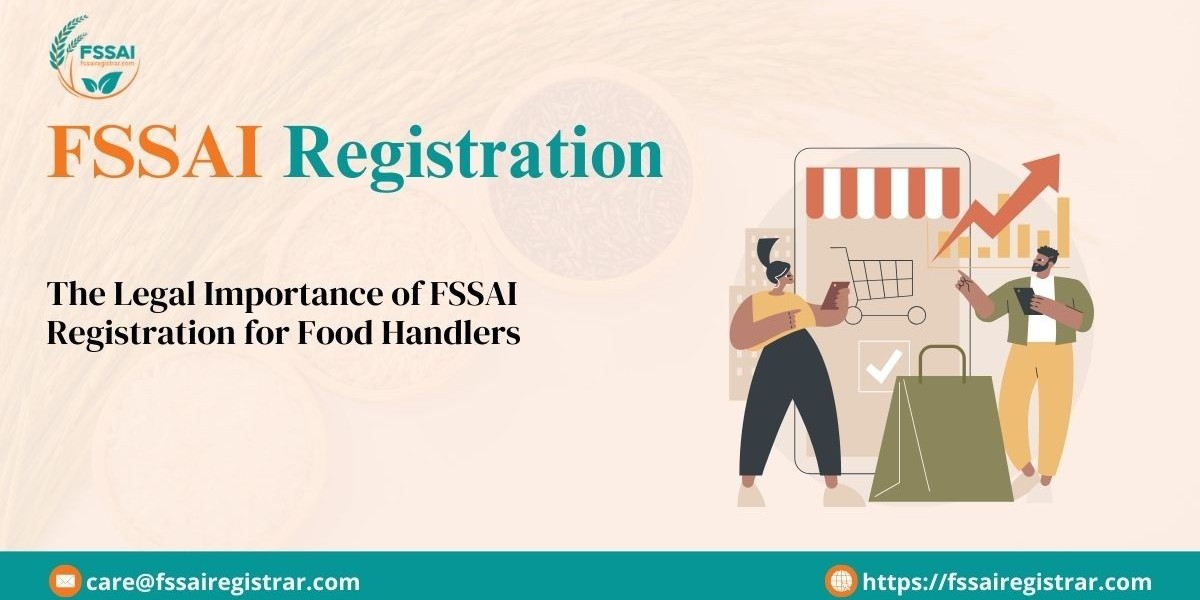Food safety is a critical concern worldwide, and in India, the Food Safety and Standards Authority of India (FSSAI) plays a vital role in ensuring that the food we consume is safe, hygienic, and free from adulteration. The FSSAI was established under the Food Safety and Standards Act, of 2006, to regulate and oversee the food industry. One of the key mandates of the FSSAI is to enforce food safety standards by requiring food businesses and handlers to obtain FSSAI registration or licenses.
For food handlers, FSSAI registration is not just a regulatory requirement but a legal obligation. It ensures that food handlers meet stringent safety standards, contributing to the larger goal of public health protection. This article delves into the legal importance of FSSAI registration for food handlers, the consequences of non-compliance, and the benefits of being registered.
The Role of FSSAI in Food Safety
The FSSAI's role is to regulate the manufacture, storage, distribution, sale, and import of food to ensure it is safe and wholesome for consumption. For food handlers, the FSSAI provides guidelines and standards related to personal hygiene, sanitation, food handling, and storage conditions.
FSSAI registration serves as a legal endorsement that food handlers are adhering to these standards. It acts as a seal of approval that the food being handled is safe for consumers. Without this registration, food handlers operate in a legally gray area, exposing themselves and their businesses to legal actions. The FSSAI periodically updates its guidelines, and food handlers must stay informed and comply to maintain their registration status.
Penalties for Non-Compliance
Non-compliance with FSSAI regulations can lead to serious legal repercussions. If a food handler is found operating without the necessary registration or license, they can be fined up to ₹5 lakh, and in some cases, imprisonment for up to six months. Additionally, the business can be shut down until the necessary legal requirements are fulfilled.
Food safety officers routinely inspect food establishments, and businesses that fail to maintain hygiene or violate FSSAI norms may face suspension or cancellation of their registration. This legal enforcement serves as a deterrent to ensure that food handlers comply with the laws, thereby contributing to a safer food ecosystem in India.
The stringent penalties underscore the importance of food handlers obtaining FSSAI registration. Non-compliance not only risks the business’s reputation but also endangers public health, making it a critical legal and ethical responsibility for food handlers to register.
Benefits of FSSAI Registration for Food Handlers
While the legal requirement of FSSAI registration is undeniable, there are several advantages to being a registered food handler.
- Building Consumer Trust: FSSAI registration acts as a stamp of credibility for food handlers. Consumers are more likely to trust and purchase food products from businesses that are FSSAI-registered, knowing that the food meets safety standards. This trust translates into business growth and consumer loyalty.
- Legal Protection: Registration ensures that food handlers are compliant with food safety laws, protecting them from potential legal disputes or actions. It also allows food handlers to operate without the fear of being penalized for non-compliance, offering peace of mind and stability in their operations.
- Access to Government Schemes: FSSAI-registered food handlers are eligible for various government schemes and subsidies aimed at promoting food safety and quality. This can provide a financial boost to small food handlers and enable them to scale their operations while adhering to safety standards.
- Competitive Advantage: In a competitive food industry, FSSAI registration gives food handlers an edge over unregistered businesses. It signals to customers, vendors, and partners that the food handler prioritizes safety and quality, making them a more attractive choice for collaboration.
FSSAI Training and Support for Food Handlers
The FSSAI doesn't just enforce regulations; it also provides training and support to help food handlers maintain safety standards. The FSSAI regularly conducts training programs on food safety management systems (FSMS) for food handlers. These programs educate handlers about proper hygiene, cross-contamination prevention, and safe food storage techniques. This training is crucial because it empowers food handlers to uphold high food safety standards in their daily operations, reducing the risk of foodborne illnesses.
By registering with FSSAI, food handlers can benefit from these training programs, enhancing their skills and knowledge of food safety protocols. This not only helps them maintain compliance but also ensures the overall safety of the food they handle, protecting consumers and boosting their business reputation.
Note: Click here to re-New your FSSAi License now - FSSAI LICENSE RENEWAL
Conclusion
FSSAI registration is a legal obligation that cannot be overlooked by food handlers. It ensures that they meet the regulatory requirements for food safety and hygiene, protecting both their business and the consumers they serve. The legal framework provided by the FSSAI is designed to promote safe and hygienic food practices, and compliance with these regulations is essential for avoiding legal consequences. Beyond the legal necessity, FSSAI registration offers numerous benefits for food handlers, including consumer trust, legal protection, access to government schemes, and competitive advantage. By embracing FSSAI registration, food handlers not only safeguard their business but also contribute to a healthier and safer food ecosystem in India.







